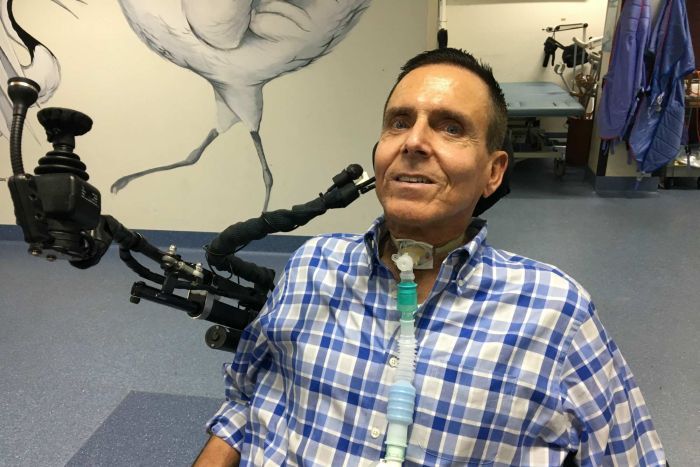Drug trial for spinal injuries could reduce damage
Posted
 Photo:
Mr Riley breathes through a ventilator after suffering spinal cord damage. (Supplied: University of Queensland)
Photo:
Mr Riley breathes through a ventilator after suffering spinal cord damage. (Supplied: University of Queensland)
Queensland researchers are optimistic a world-first trial will revolutionise the recovery for people with new spinal cord injuries.
The University of Queensland and Princess Alexandra Hospital have begun a three-year study on humans, after animal testing proved effective.
As part of the trial, people will be given an anti-inflammatory drug called "intravenous immunoglobulin therapy" within 12 hours of suffering spinal cord trauma.
When a spinal cord is injured, it becomes inflamed which causes more damage.
Dr Marc Ruitenberg from the University of Queensland's School of Biomedical Science said the drug was found to reduce tissue damage in mice.
"We are obviously hoping that it will be very successful and that we will be able to see some differences," he said.
"We found it was very effective in stopping that inflammation and the associated tissue damage and as a result of that, the recovery was vastly improved.
 Photo:
Queensland researchers are optimistic the trial will revolutionise spinal recovery. (Supplied: University of Queensland)
Photo:
Queensland researchers are optimistic the trial will revolutionise spinal recovery. (Supplied: University of Queensland)
"If we can prove that, then that would obviously pave the way for other trials."
Trial offers hope
Spinal surgeon Dr Kate Campbell said the trial would recruit 20 patients through the PA Hospital but at this early stage, it is unknown just how effective the drug will be in improving movement in humans.
"If we can save their triceps function, it means they can independently push themselves out of a wheelchair," she said.
"It means they can put themselves to bed at night and get themselves up in the morning.
"Unfortunately this isn't for anyone who has previously had a spinal cord injury."
David Riley has needed a ventilator to breathe since he was knocked off his bike by someone opening a car door.
He said the world-first trial provides hope.
"It does give us a lot of hope that it could be successful going into human trials," he said.
"It might have been able to save my injury a little bit and get some function in my arms or hands or be off the ventilator.
"If the trial is successful and it does give us the improvements that it's hoping to, then yes, it would be a major game changer."
It is hoped the study will lead to larger trials if the recovery results prove promising.
Topics: research, science-and-technology, medical-research, brisbane-4000, qld







